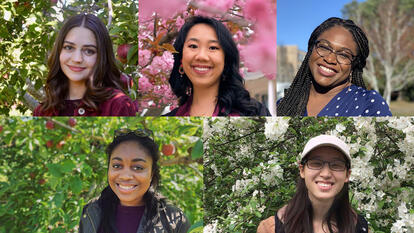MIT/Wellesley and Upward Bound, a Partnership Since the 1960s

You are a bright high school student, and you plan to go to college. You may be the first in your family to walk this path. Your family is not wealthy. Applications, financial aid forms, and college interviews intimidate you, but you keep steady. It is a difficult climb—but not impossible, especially with the help of educational support programs such as Upward Bound.
Since the mid-1960s, the co-ed MIT/Wellesley Upward Bound program has invested in the dreams of Cambridge, Mass., students from Cambridge Rindge and Latin School who are not traditionally considered college bound. It was an outgrowth out of another educational program, the MIT Science Day Camp, which started in 1965; Wellesley became involved in 1968.
Students engage in rigorous academic study in mathematics, science, literature, and foreign languages, taking courses on MIT’s campus during the school year before spending six weeks during the summer at Wellesley.
Soliana Yebio, who is heading into her senior year at Rindge, said the program has given her the confidence to speak in public with the help of sessions such as “Stand and Deliver,” in which she talked about her research projects. “I was really a shy person, but I lost my shyness,” she said. “I was nervous about talking to people I didn’t know. But then it became natural for me to look people in the eyes and just speak.”
Yebio said that while she has not decided on her career aspirations, she believes she is prepared for her next step. “I feel ready for college,” she said. “My mom told me that a college education is something that no one can take away from you. I want this.”
Like Yebio, some of the participants in Upward Bound are first-generation college students, said Evette M. Layne, MIT/Wellesley Upward Bound program director. Upward Bound arrived on the educational landscape in the mid-1960s as an opportunity program for students who might otherwise find closed doors and limited chances for higher education due to circumstances beyond their control, mostly based on their race and income.
“These are exceptional students” said Layne. “They are good, smart, and looking at moving ahead. We are grateful to have Wellesley as a partner.”
Wellesley Provost and Dean of the College Andy Shennan talked about the program during his remarks at the College’s convocation in August 2016. He spoke of its cohesion with Wellesley’s values of access and equity. Some other colleges and universities across the country that had launched similar efforts did not stick with them over time, he pointed out.
“The truth…is that on many other campuses such programs have fallen by the wayside,” said Shennan in his remarks. “Not on ours. With our MIT partners, we have remained true to the principles that motivated us in the first place and kept the program running.”
During the school year, students take classes at MIT. They stay on Wellesley’s campus for six weeks in the summer and live the routine of attending college—taking three academically challenging classes, adapting to a new environment, going to study halls, and doing homework.
On August 1, this summer’s crop of Upward Bound students read papers and displayed posters illustrating their work during an academic exposition in Tishman Commons.
For some students, Upward Bound has become a family tradition. John Figueroa, also from Cambridge Rindge and Latin School, has an older sister who went through the program and a younger one who enrolled this year. At the exhibition, he presented his work on algebraic problem solving.
“I love it,” he said of his experience. “It opened my mind, and I see possibilities. I could be a scientist but I don’t know yet. Me, a scientist? It makes my mind race.”
Figueroa’s father, Louis, stood by his side. He smiled, teared up, and patted his son on the shoulder. “It is my dream for my kids to progress in life and get a college degree,” he said. “Kids need to be exposed to see what they can be. John got that here.”



